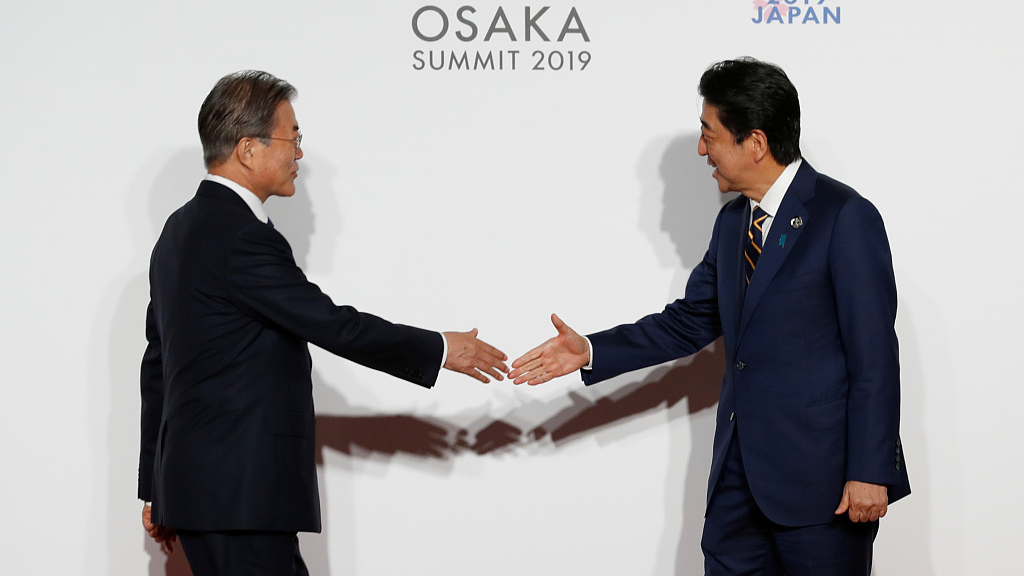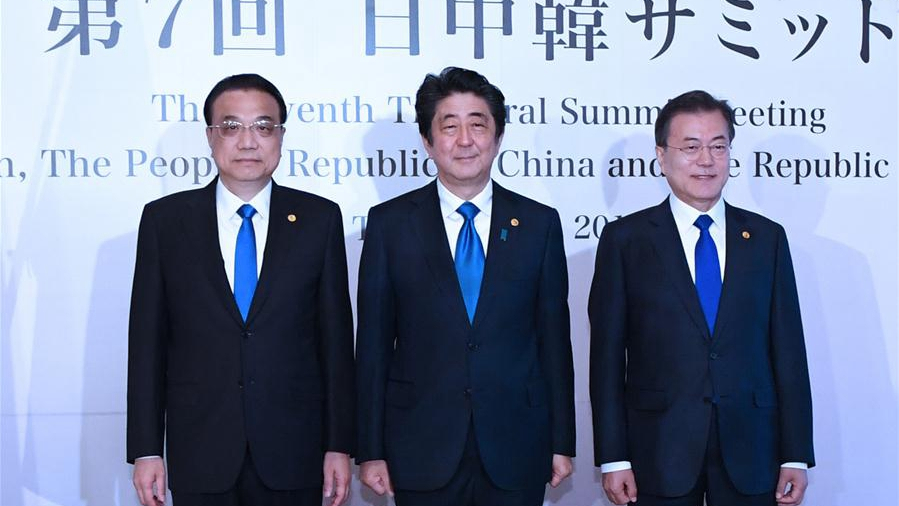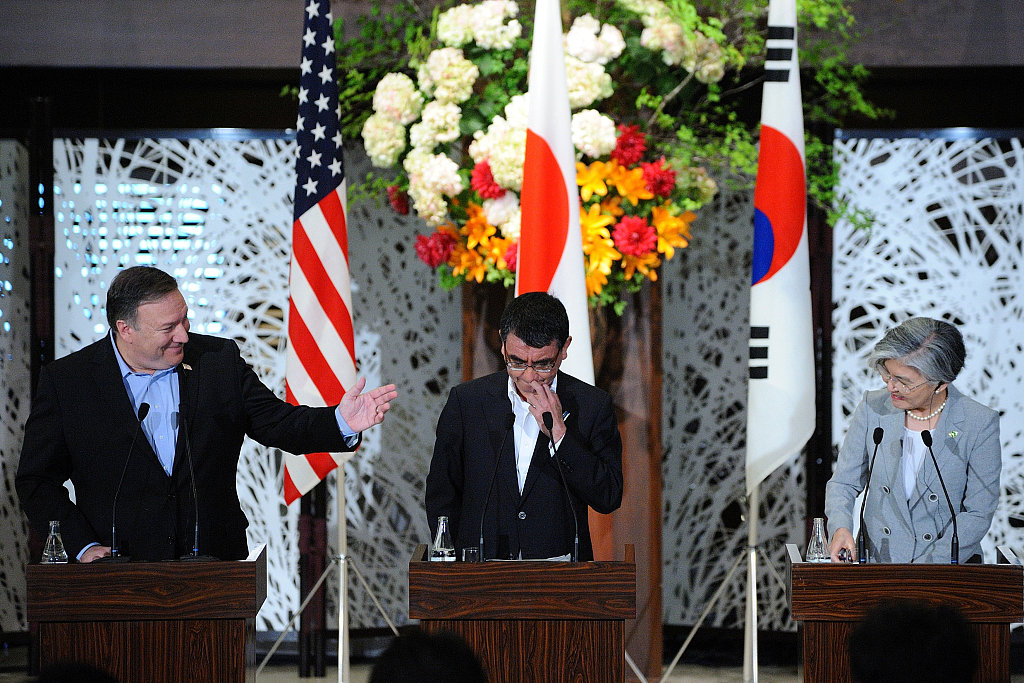

Editor's note: Chris Deacon is a postgraduate researcher in politics and international relations at the University of London and previously worked as an international commercial lawyer. The article reflects the author's opinions, and not necessarily the views of CGTN.
News has emerged this week of a new trade dispute in the making between Japan and the Republic of Korea (ROK). Japanese measures, announced on Monday, will introduce export controls onto the ROK likely to negatively affect memory chip manufacturers and cause knock-on effects to the electronics industry more broadly.
The restrictions, beginning on July 4, will require Japanese chemical suppliers to seek governmental approval before exporting certain items to the ROK. Even if permission is granted, the process is likely to cause damaging delays to ROK’s important chipmaking industry.
As chips made in the ROK are commonly used in a wide range of electronic devices – from phones made by Apple, to televisions made by Sony and computers made by Lenovo – the effects of these restrictions are likely to be felt across the globe.
In addition, Japan announced that it plans to take the ROK off the “white list” of allies, such as the U.S. and the UK, which will result in additional governmental approvals being required for the exporting of items which could be used for military applications. If this plan is carried out, it will be the first time that the Japanese Ministry of Economy, Trade and Industry (METI) removes a country from the list.

(L-R) Chinese Premier Li Keqiang, Japanese Prime Minister Shinzo Abe and South Korean President Moon Jae-in attend the 7th China-Japan-ROK leaders' meeting in Tokyo, Japan, May 9, 2018. /Xinhua Photo
These moves come in the context of dramatically worsening relations between Japan and the ROK in recent months and years. The Japanese government did not shy away from acknowledging these tensions as the primary motivation for the new measures and planned removal of the ROK from the export white list.
Other recent measures stemming from the deteriorating relationship include increased Japanese inspections on seafood products imported from the ROK. The introduction of these restrictions has been linked to ROK’s refusal to drop its own restrictions on food imports from the Fukushima region of Japan, which was affected by the March 2011 nuclear disaster.
In response to the moves, the ROK was quick to summon the Japanese ambassador to demand that the restrictions be removed. The ROK also pointed out that Japan’s introduction of these measures appears to contradict Prime Minister Shinzo Abe’s recent rhetoric criticizing of protectionism and advocating of free and fair trade, repeated at the G20 Summit held in Osaka this past weekend.
Japanese Cabinet Secretary Yoshihide Suga responded that Japan had to take into account national security concerns when it came to the export white list of allies, citing damaged trust through recent actions by the ROK – likely alluding to the radar lock-on incident between the two countries’ navies that took place in December last year.
Suga also referred to the recent bitter dispute between the ROK and Japan regarding the Korean victims of forced labor during the period of Japanese colonial rule seeking compensation from the corporations involved. Last year ROK’s Supreme Court ruled that such companies would have to pay compensation to the victims.

U.S. Secretary of State Mike Pompeo (L), Japanese FM Taro Kono (C) and South Korean FM Kang Kyung-wha attend a joint press conference at the Japan-U.S.-ROK Trilateral Foreign Ministers' Meeting at the Iikura Guesthouse of the Foreign Ministry in Tokyo, Japan, July 8, 2018. /VCG Photo
When ROK President Moon Jae-in refused to step in against the judgment, Abe and his cabinet reacted with anger, claiming that all such disputes were settled by the 1965 normalization treaty between the two countries. Japan was already frustrated with Moon, by this point, for having abandoned the 2015 agreement negotiated between Abe and former ROK president Park Geun-hye purportedly settling finally the “comfort women” dispute.
Japan generally takes the position that these historical matters – while needing to be dealt with fairly – cannot be reopened continuously when past agreements have purported to finalize them. The ROK government, on the other hand, is under pressure from a public which refuses to accept the validity of such agreements and regularly feels antagonized by the language of Japanese conservatives regarding the country’s wartime history.
The worsening in relations can also be viewed in the context of the shifting nature of the U.S. alliance system in East Asia under Donald Trump. Former President Barack Obama, for example, worked hard to try to bring the ROK and Japan together – including playing a significant role in the run-up to the above-mentioned “comfort women” agreement. President Trump, on the other hand, seems to care little about U.S. interests in keeping the peace between these two countries.
There is no quick fix for the “history problem” between the ROK and Japan – it will require hard work over decades, not just between the governments of these countries, but – perhaps even more importantly – between their peoples. In the meantime, however, both countries, and their important allies such as the U.S., have an interest in maintaining as cordial relations as possible.
Without the U.S. there to play mediator, things may continue to go from bad to worse over the coming months and years. Depending on quite how bad relations get, it will be interesting to see if another third country – such as China – attempts to interfere to calm the damaging impulses of each country. This is not a dispute the escalation of which will benefit anyone.
(If you want to contribute and have specific expertise, please contact us at opinions@cgtn.com.)

Copyright © 2018 CGTN. Beijing ICP prepared NO.16065310-3
Copyright © 2018 CGTN. Beijing ICP prepared NO.16065310-3